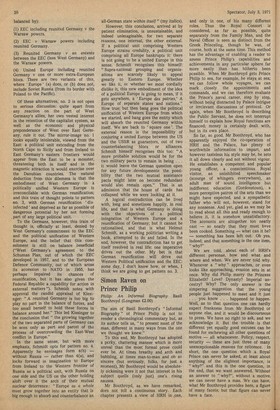Simon Raven on Prince Philip
Philip: An Informal Biography Basil Boothroyd (Longman £2.00) The aim of Basil Boothroyd's "Informal Biography" of Prince Philip is not to render a chronological commentary but, as its author tells us, "to present most of the man, different in many ways from the one we thought we knew."
To this end, Mr Boothroyd has adopted a perky, chattering manner which is more unreal than the most formal prose could ever be. At times breathy and arch and bubbling, at times man-to-man and oh so sincere (but seriously, folks, for just a moment), Mr Boothroyd would be absolutely sickening were it not that interest in his subject quells (only just) one's rising nausea.
Mr Boothroyd, as we have remarked, does not tell a continuous story. Each chapter presents a view of HRH in \one, and only in one, of his many different roles. Thus the Royal Consort is considered, as far as possible, quite separately from the Family Man, and the Naval Officer is seen as distinct from the Greek Princeling, though he was, of course, both at the same time. This method has the advantage of enabling a reader to assess Prince Philip's capabilities and achievements in any particular sphere far more easily than has hitherto been possible. When Mr Boothroyd gets Prince Philip to sea, for example, he stays at sea; we can follow whole voyages, we can mark closely the appointments and commands, and we can therefore evaluate the Prince's naval career, step by step, without being distracted by Palace intrigue or irrelevant discussions of protocol. Or again, when Mr Boothroyd is describing the Public Servant, he does not interrupt himself to explain how Royal functions are financed; money is certainly dealt with, but in its own place.
So far, so good. Mr Boothroyd, who has apparently enjoyed the co-operation of HRH and the Palace, has plenty of worthwhile information to impart, and however tasteless his style may be, he sets it all down clearly and not without vigour. He establishes a competent and popular young officer, a conscientious Royal visitor, an uninhibited speechmaker (scourge of whingers everywhere), an adult man of sound intelligence but indifferent education (Gordonstoun), a more perceptive patron of the arts than we might have expected, and a sympathetic father who will not, however, stand for any nonsense. And yet, glad as we may be to read about all this and ready enough to believe it, it is somehow unsatisfactory. The accounts are altogether too neatly cast — so neatly that they must hAve been cooked. Something — what can it be? — something has been left out. Oh yes, indeed; and that something is the one item, "why?"
We are told, about each of HRH's different personae, how and what and where and when. We are never told why. Whenever a " why " approaches, or even looks like approaching, evasion sets in at once. Why did Philip marry the Princess Elizabeth? Love? Dynasty? Imperial ancestry? Why? The only answer is the simpering suggestion that the young people just happened to meet and it just . . . you know . . . happened to happen. Well, as to that question one can hardly expect frankness from Mr Boothroyd or anyone else, and it would be discourteous to press. We have no right to ask, and we acknowledge it. But the trouble is that different yet equally good excuses can be found for eschewing all other questions of motive — all whatsoever. Policy, respect, security — these are just three of many unexceptionable reasons for reticence. In short, the one question which a Royal Prince can never be asked, at least about anything of the slightest importance, is "why?" and this is the one question, in the end, that we want answered. Without an answer to "why?", without a motive, we can never have a man. We can have, what Mr Boothroyd provides here, a figure of many facets; but that figure can never have a face.






















































 Previous page
Previous page